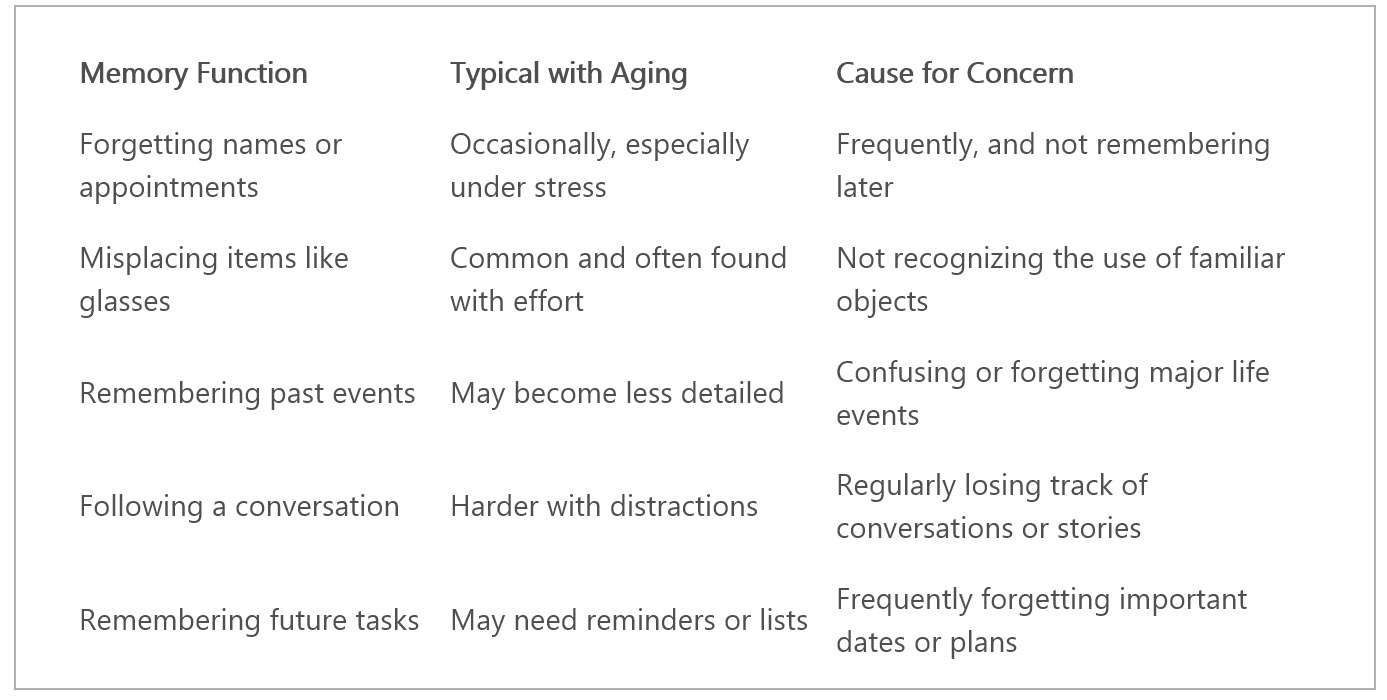Is My Memory Loss Normal? Understanding Age-Related Memory Changes vs. Early Signs of Dementia
Are you wondering if your memory lapses are just normal signs of aging — or an early warning of dementia? Occasional forgetfulness can be a natural part of getting older. But when memory problems become more frequent or interfere with daily life, it may be time to seek a professional evaluation. Understanding the difference between normal age-related memory loss and the early signs of dementia is key. In this blog, we’ll explain common memory changes, warning signs to watch for, and how a neuropsychological evaluation can help you get clarity and peace of mind.
Not All Memory Is the Same
Many people think of memory as one single ability — you either have a “good memory” or you don’t. But in reality, the brain relies on multiple memory systems, and not all are equally affected by aging or cognitive decline.
Memory Changes That Are Common With Age
1. Episodic Memory
This is the ability to remember specific experiences, like what you ate for dinner last night or who told you a piece of news.
What’s normal?
Occasionally forgetting where you put your keys, missing an item on your shopping list, or needing more time to recall names or dates.
What’s not?
Forgetting an entire conversation, repeating the same questions multiple times, or getting lost in familiar places. These may be early signs of dementia or due to another underlying neurological or medical condition, and should be discussed with your doctor.
✳️ Note: Stress, poor sleep, depression, anxiety, past or current trauma, medication side effects, and health issues like sleep apnea or vitamin deficiencies can also affect memory. Not all memory changes mean dementia.
2. Prospective Memory
This refers to remembering to do things in the future — like taking your medication at 2:00 PM or returning a phone call or email.
Older adults often find that this type of memory becomes less reliable, but many successfully use tools like calendars, reminders, and routines to compensate.
3. Working Memory
This allows you to hold and use information over brief periods of time — like following instructions, doing mental math, or recalling someone’s name during a conversation. It tends to decline gradually with age, making multitasking or quickly processing new information more difficult.
Memory Abilities That Often Stay Strong with Age
While some types of memory decline with aging, others remain stable or even improve:
✅ Semantic Memory
This is your store of knowledge — facts, vocabulary, and general information. You may have more “tip-of-the-tongue” moments, but the knowledge is still there.
🧠 Think of it like a library: the books are there, but it might take a bit longer to find the one you want.
✅ Procedural Memory
This covers habits and skills, like driving, cooking, riding a bicycle, or playing a musical instrument. These abilities are often well preserved throughout life.
✅ Primary Memory (Attention Span)
The ability to hold a small amount of information briefly — like remembering a phone number just long enough to dial it — usually remains stable with age.
Do All Older Adults Experience Memory Loss?
Not necessarily. Brain aging looks different from person to person. A variety of factors — such as genetics, lifestyle habits (including exercise, diet, and sleep), physical health (like blood pressure, cholesterol levels, and chronic conditions such as diabetes or sleep apnea), and mental well-being (such as unresolved depression, trauma, or chronic stress) — all play a role in how the brain ages and how memory changes over time.
Some people remain sharp into their 80s or beyond.
Summary: What’s Normal and What’s Not?

When to Seek Help
If memory changes are:
- Increasing in frequency or severity
- Interfering with your daily life or family responsibilities
- Noticed by friends or family
- Causing confusion or concern
…it may be time to consider a comprehensive neuropsychological evaluation.
How a Neuropsychological Evaluation Can Help
At our Neuropsychological Evaluation and Testing Clinic in Toronto, we specialize in helping adults and older adults determine whether their memory changes reflect normal cognitive aging, mild cognitive impairment, or an early dementia process.
A comprehensive evaluation — including cognitive testing and DSM-5TR-based psychological assessment — provides clarity, peace of mind, and personalized recommendations to support your brain health.
Ready to Learn More?
If you’re concerned about memory loss or want to better understand your cognitive health, contact us today to schedule a consultation with our experienced neuropsychologists. We’re here to help you navigate memory changes with confidence.





